Don’t be left out in the cold – learn about the climate-friendly refrigeration technologies of the future
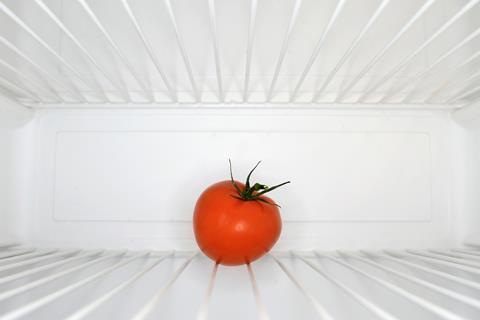
Prior to the advent of the domestic refrigerator, food was kept cool in the home by placing it on a stone slab in the pantry. Many well-off families also had access to ice, which was collected in winter and then stored underground all year in purpose-built ice houses. In the 1920s, the introduction of the electric domestic refrigerator revolutionised perishable food storage in the UK. But it wasn’t until the late 1960s that fridges became affordable enough for general use in homes. Today, fridges are regarded as essential appliances in the Western world.
Air conditioning is the newer kid on the block, at least in the UK. Cars have been fitted with cooling systems for a couple of decades now. An increasing number of public spaces have air conditioning systems, but very few UK homes have them. As the planet heats up, however, the use of air conditioning in the UK and other countries with previously temperate climates is expected to soar.
The irony here is that the very technology we’re increasingly relying on to survive on a warming Earth is making our home planet even warmer
Most refrigerators and air conditioners work in a similar way: vapour-compression. Phase change materials, called refrigerants, are pumped through a closed circular tube between a location that needs cooling and a place where excess heat can be expelled.
These phase change materials can switch between liquid and gas states repeatedly. In a fridge, when refrigerant enters the section of tube inside the fridge where the food is kept, it is in its liquid form. Once there, the refrigerant absorbs heat from inside the fridge and turns into a gas. The gas is then pumped to the fridge’s exterior at the back, where the heat is expelled and it turns back into a liquid. The liquid is then pumped back into the section of tube inside the fridge to begin the cooling process all over again.
A climate conundrum
Our lives have been revolutionised by refrigeration and air conditioning over the past century or so. Refrigeration has improved food availability, food safety and healthcare, while air conditioning allows us to survive and thrive in hostile climates.
There is, however, a flip side to these cooling technologies: they contribute significantly to climate change. Firstly, most cooling technologies are major energy guzzlers, which is a problem because fossil fuels still provide the vast majority of the world’s electricity. According to estimates, an average US domestic refrigerator consumes more electricity per year than an average person in dozens of other countries. And the International Energy Agency reports that air conditioners and electric fans currently account for 10% of all global electricity consumption.
In your class
Can we cool without the need for electricity from fossil fuels or climate-damaging chemical refrigerants? Investigate endothermic reactions using citric acid and sodium hydrogencarbonate, which take in energy from their surroundings. Challenge your learners to reduce the temperature of water in under a minute using neither electricity or harmful CFCs.
Secondly, the chemical refrigerants used in these technologies contribute to climate change. The chlorofluorocarbons (CFCs) that damaged the ozone layer may no longer be manufactured, but their most common replacements (hydrofluorocarbons) are extremely potent greenhouse gases. While refrigerants can and do leak from damaged appliances over their lifetimes, improper disposal is the primary cause of their release into the environment.
The irony here is that the very technology we’re increasingly relying on to survive on a warming Earth is making it even warmer. A global effort is underway to develop more climate-friendly cooling technologies to help resolve this climate conundrum.
Circumventing spikes
Chair in thermal energy engineering at the University of Birmingham Yongliang Li is part of a research group developing cooling systems compatible with renewable energy generation. These, he explains, will be needed to manage spikes in electricity demand as air conditioning use in UK homes grows. ‘The cooling requirement [at any moment in time] is highly correlated to the weather,’ says Yongliang. ‘Every house will turn on their air con at the same time and this is going to cause spike demand in electricity.’
With net zero targets, more electricity will be generated by renewable sources, such as solar and wind. Yongliang says that renewables will mean the grid is less able to cope with spikes in electricity demand because they offer less control over when electricity is generated than fossil fuels do. His group is developing ‘a cool storing technology that can decouple the electricity consumption and cooling demand so that we can produce cold when there is more renewable electricity available, but use cold when the end user needs it’.
-
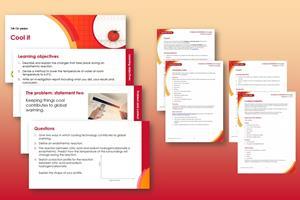
Download this
Practical activity, for age range 14–16
In this practical, your learners compete to devise a method to lower the temperature of water to 6.5°C using citric acid and sodium hydrogencarbonate.
Download the presentation slides as MS Powerpoint or pdf the student worksheet as MS Word or pdf the teacher notes as MS Word or pdf and the technician notes as MS Word or pdf.
Download this
Practical activity, for age range 14–16
Get your learners to compete in devising a method to lower the temperature of water to 6.5°C using citric acid and sodium hydrogencarbonate.
Download the resources from the Education in Chemistry website: rsc.li/3mSPUFq
Slurry success
The first generation of air conditioners and refrigerators that work in this way are already on the market, with ice slurry used as the refrigerant. Water is a natural phase change material, able to switch easily between solid, liquid and gas. When electricity demand is low (eg at night), liquid water is frozen to create an ice slurry and stored in a tank. When needed, the slurry is pumped out of the tank through the circular tube system to the location where cooling is needed. Here, it absorbs heat and returns to its liquid form. The liquid water is then pumped back to the tank to await freezing in off-peak hours.
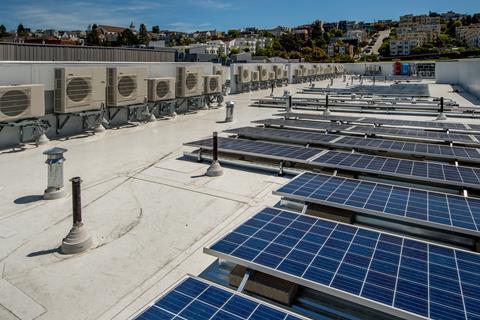
This type of system requires energy for both pumping and freezing the refrigerants. Yongliang is developing two types of inert refrigerants that work like the ice slurry but are less energy hungry. His slurries are designed to be less viscous than ice slurry (so they require less electricity to pump around the tube) and to freeze at higher temperatures than water (so they require less electricity for freezing).
The first type of slurry contains hydrocarbon-based refrigerants encased in micro-sized polymer capsules. These capsules are dispersed in an inert carrier fluid. Depending on the melting point of the hydrocarbon inside the capsules, systems using this type of slurry will be suitable for cooling at a wide range of temperatures, for use in anything from air conditioning to cryogenics.
The second slurry contains carbon dioxide hydrate. This hydrate is comprised of gaseous carbon dioxide trapped in networks of ice crystals. ‘We can formulate the solid at 8–10°C, rather than 0°C,’ Yongliang explains. This slurry is suitable for air conditioning but can’t produce temperatures cold enough for refrigeration. He estimates that these second-generation slurries for cooling technologies could be commercialised in around five years.
Solid solutions
Using solid materials to absorb unwanted heat instead of liquid refrigerants is another approach being explored by researchers, including Ray Baughman at the University of Texas in Dallas, US. The solid heat exchange materials under development are inert in the environment and therefore wouldn’t contribute to climate change in the way that the current hydrofluorocarbon refrigerants do. Devices containing these materials will also likely consume less energy than current technologies.
This type of cooling technology is still in the very early development stages, meaning its design is far from finalised. A potential refrigerator design would have an inert liquid, such as water, flow around the closed circular tube system with a cool solid material located in one section of the tube. As the water flows over the solid, it will be cooled and the solid will heat up.
More resources
- Discover how sunlight and saltwater could offer a low-power alternative to air conditioning in small spaces with this science research news starter slide.
- Would we be less reliant on air conditioning if we used the whitest white paint? Share this starter slide on nano particles and ionic substances with your 14–16 students to reveal the answer.
- ‘There must be a global ban on the burning of fossil fuels to supply energy. What do you think?’ Engage your learners in this lively debate.
- Use these job profiles to show your students some of the scientists using their skills and knowledge to help fix the future.
- Discover more ways to link chemistry curriculum topics to sustainability with our sustainability in chemistry series.
More resources
- Show your 14–16 students how sunlight and saltwater could offer a low-power alternative to air conditioning in small spaces with this science research news starter slide: rsc.li/3yUSAVT
- Would we be less relaint on air conditioning if we use the whitest white paint? Show your 14–16 students this starter slide on nano particles and ionic substances to reveal the answer: rsc.li/3yz6ZXx
- ‘There must be a global ban on the burning of fossil fuels to supply energy. What do you think?’ Engage your learners in this lively debate: rsc.li/3Jd3HOx
- Inspire your students by sharing job profiles of scientists using their skills and knowledge to fix the future: rsc.li/429TvyO
- Discover more ways to link chemistry curriculum topics to sustainability with our sustainability in chemistry series: rsc.li/3JfzHlc
Twist and cool
Regardless of the device design, the solid material will need to be able to be easily re-cooled again and again. For this, Ray’s group is exploring a novel approach that uses twisting and stretching to change the entropy of the material. The fact that solids can change temperature when stretched first came to the fore over two centuries ago. ‘In 1805, a person stretched a rubber fibre and noticed that it felt hotter when he touched it to his lips. When he released it, it got colder,’ says Ray.

By stretching and releasing the rubber, the gentleman changed the amount of disorder in the particle arrangement in the material, which led to the change in temperature. When stretched, the molecules in the rubber band became much more ordered, lowering its entropy. This caused the release of thermal energy (heat). By contrast, when the rubber relaxed back to its original shape, it became more disordered, its entropy rose and it absorbed heat from the surrounding environment – the gentleman’s lip.
Ray’s group have been able to increase this cooling effect by using fibres that are both stretched and tightly coiled. The combined effect of untwisting and releasing the stretch of the fibres leads to a much greater entropy release than stretching alone. So far, the researchers have explored natural rubber, poly(ethene) fishing line and nickel titanium wires used for dental braces as materials for this purpose. The cooling efficiency of other yet-to-be-explored materials may be even greater, Ray states.
‘Our ultimate goal would be to use this technology for domestic refrigerators,’ he says. Ray already has a name for these: twist fridges. Other potential applications he suggests are portable food coolers, air conditioning and cooling for computers and other electronic devices.
We’ll have to wait and see whether Yongliang’s or Ray’s supercool – pun intended – new technologies make it to market. But what is certain is that cooling technologies are one of many things that urgently need to change if humanity is to veer off its current path towards climate catastrophe.
Article by Nina Notman, a freelance science writer and editor specialising in chemistry. Resource adapted from In Search of More Solutions compiled by Janet Taylor with additional updates by Dorothy Warren.





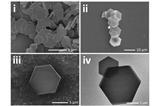
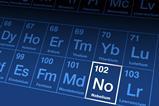







No comments yet